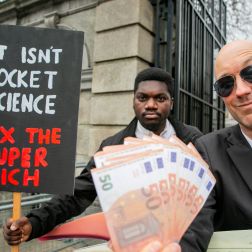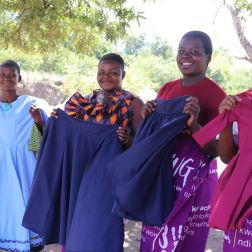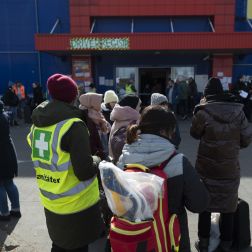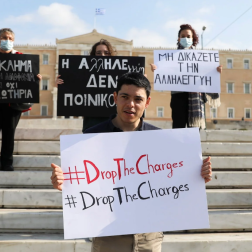- 8 mins read time
- Published: 12th January 2017
A world where 8 men own the same wealth as humanity’s poorer half
16/01/17
A new Oxfam report, An Economy for the 99%, published by Oxfam today shows that the inequality crisis is far bigger than previously thought – today just eight men own the same wealth as the 3.6 billion people who make up the poorer half of humanity. This huge gap between the super-rich and the rest of us is trapping millions in poverty, fracturing our societies and undermining democracy.
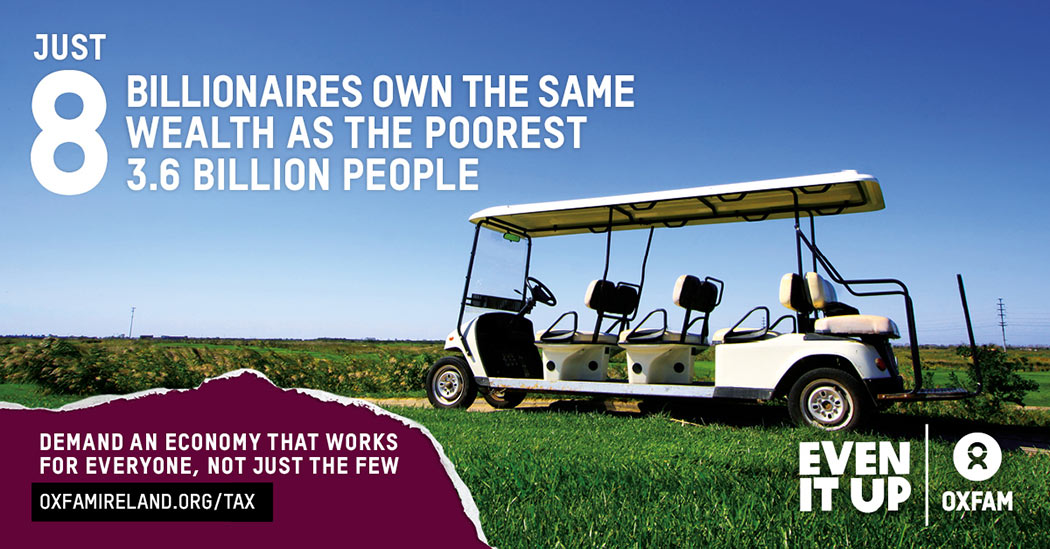
The vast majority of people at the bottom half of the world’s population are very poor people who are struggling to get by. Approximately 70% of this group live in low income countries. One in four people live in India, while one in five is in sub-Saharan Africa. Just 1% are in North America and 8% in Europe.
It is true that in recent decades poorer countries have been growing faster than richer ones, and we are starting to see the gap between countries narrow. Hundreds of millions of people have been lifted out of poverty in recent decades, an achievement of which the world should be proud. Yet one in nine people still go to bed hungry. Had inequality not increased over this period, 700 million more people, most of them women, would not be living in poverty today. The World Bank is clear that without redoubling their efforts to tackle inequality, world leaders will miss their global goal of ending extreme poverty by 2030.
At the same time, inequality within nations has been rising in the majority of countries over the last 30 years and is having a hugely negative impact on many people’s lives.
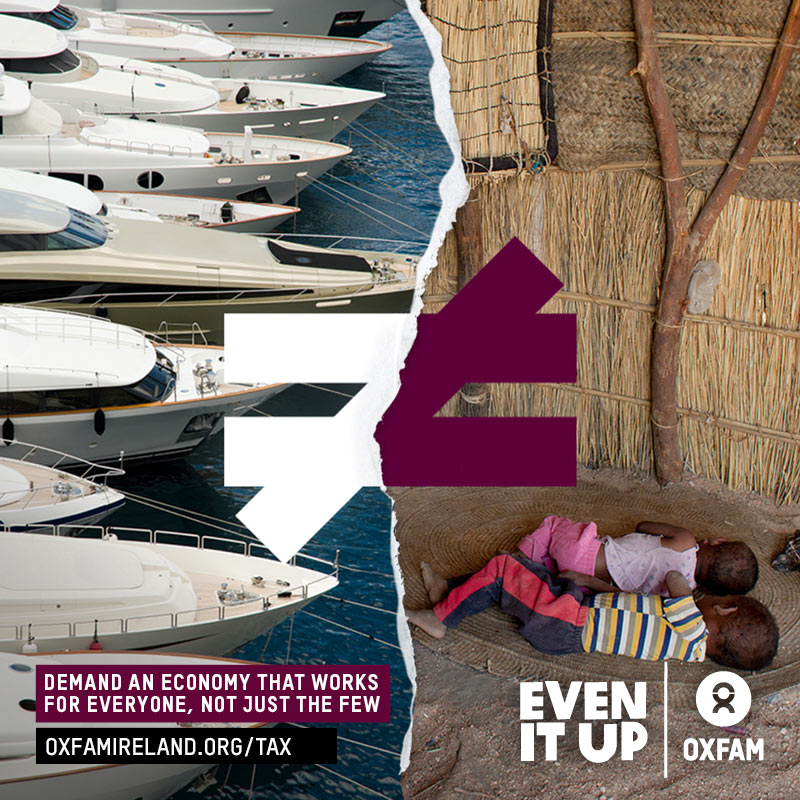
Meet Jane
Jane Muthoni she sells homemade bags, mats, jewellery, soap and tie-dyed material in one of Nairobi’s many informal settlements. The small amount of money she makes helps put food on the table and send her two children to school. But it’s hard for small stallholders like Jane to earn enough money, no matter how hard they work. Though they pay fees and taxes to trade, Jane says they don’t have the same rights and services as rich people.
“We do not have very good roads,” says Jane. “We don’t have good houses. There is no proper drainage. When it is dark, there are no lights. It is very unfair because we are all Kenyans. We are entitled to equal rights, but there are those big people who do things I can’t because I don’t have money.
“The gap between poor and rich people in Kenya is sometimes very humiliating. To see that it is just a wall that defines these rich people from the lower class. You find that some of their children drive cars and when you are passing around the roads you get covered in dust, or if it is raining you are splashed with water.”
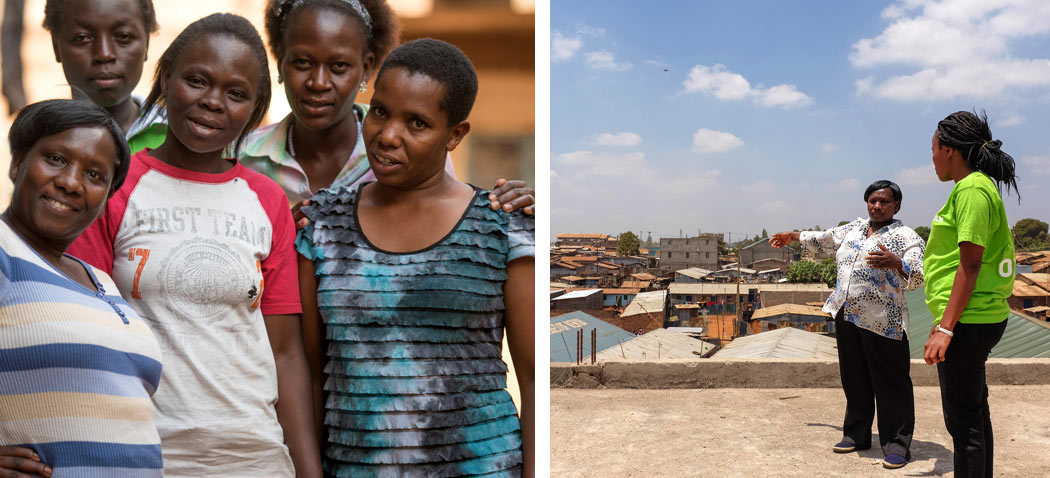
Above left: Jane Muthoni (front in striped top) with fellow members of Shining Mothers, a community based group teaching women business skills. The group also ensures their voice is being heard by the local government. Photo: Allan Gichigi/Oxfam. Above right: Jane describes her local area to Oxfam’s Joyce Kabue and points out poor public services in her community in Kawangware, Nairobi, Kenya. Photo: Allan Gichigi/Oxfam
Jane is trying to change this situation. She has set up a community women’s group called the Shining Mothers, which is supported by one of Oxfam’s local partners. This group has regular ‘table banking’ meetings to teach business skills and help each other with their savings and loans. The Shining Mothers discuss issues which affect them in their community and raise these at public meetings, to ensure their voice is being heard by the local government.
At a recent meeting with the council, Jane and the Shining Mothers raised the issue of council fee collection and it was established that the council should only come twice a week. Empowered with this knowledge, the Shining Mothers have pushed back against the exploitative fees and have been able to continue saving for their business licence.
“That is the most enjoyable thing, empowering my community,” Jane added. “Because if a community is not empowered, we will live in poverty forever.”
While Jane struggles, Kenya’s economy is growing. The richest Kenyan’s net worth is over $700 million, yet 42% of the country’s 44 million people still live below the poverty line. Big corporations operating in Kenya pocket $1.1 billion a year in tax incentives. Yet small-scale traders like Jane face difficult application processes in order to access credit and loans. Many are forced to pay unlawful daily fees to the county government in order to operate yet there is no waste collection, infrastructure or even a decent water supply in the informal trading areas where they work.
Economic growth does not automatically translate into society-wide prosperity for people like Jane, unless appropriate policies are implemented by governments across the world.
The extreme levels of inequality documented in our new report are having major national and international consequences. From Brexit and the success of Donald Trump’s US presidential campaign, to the rise of populism around the globe and widespread disillusionment with mainstream politics, there are increasing signs that more and more people are no longer willing to tolerate the status quo.
The last time the world experienced similar extreme levels of inequality was at the start of the 20th century, where we experienced 30 years of violent political upheaval and war as a result of inaction on inequality.
This report lays out a blueprint for what a more human global economy would look like, which includes greater cooperation between governments on tax dodging to generate the funds needed to invest in healthcare, education and job creation, and by dismantling the barriers to women’s economic progress such as access to education and the unfair burden of unpaid care work. (On current trends it will take 170 years for women to be paid the same as men).
Tax revenues are critical for funding the policies and services that can fight inequality including infrastructure, health and education. The use of tax havens and loopholes or the securing of preferential tax treatment doesn’t just reduce abstract balance sheets. Everyone else is forced to pick up the bill and the human cost is borne by the most vulnerable in society.
Take action on tax
In this respect Ireland needs to fulfil its commitments to reform and be part of a fair and just tax system at EU and international level. We need to tackle aggressive tax planning, to implement strong controlled foreign company rules to prevent profit-shifting and improve transparency by forcing multinational corporations to make public where they make profits and pay tax. Ireland needs to support a new generation of international tax reforms beyond what has been agreed at EU and OECD level to date, including the creation of a global tax body.
With Northern Ireland set to take control of corporation tax in 2018, the Stormont Executive must ensure any new proposed tax regime here is fair, open and transparent – and that it does not negatively impact on vulnerable people. Any reform of the corporate tax system must contain safeguards preventing corporations from taking advantage to avoid tax owed elsewhere. Otherwise there is a risk that Northern Ireland could be used as a tax haven.
Finally, it is important to remember that inequality is not inevitable. Global inequality has been reversed before, and can be again. World leaders can rebalance economies with every budget passed and every rule of law or regulation written or dismantled. As per the name of our campaign against economic inequality, is time to ‘Even it Up’.
Michael McCarthy Flynn is Oxfam Ireland’s Senior Research and Policy Coordinator
Watch Jane's story
This webpage has been produced with the financial assistance of the European Union. The contents of this webpage are the sole responsibility of Oxfam and can under no circumstances be regarded as reflecting the position of the European Union.
